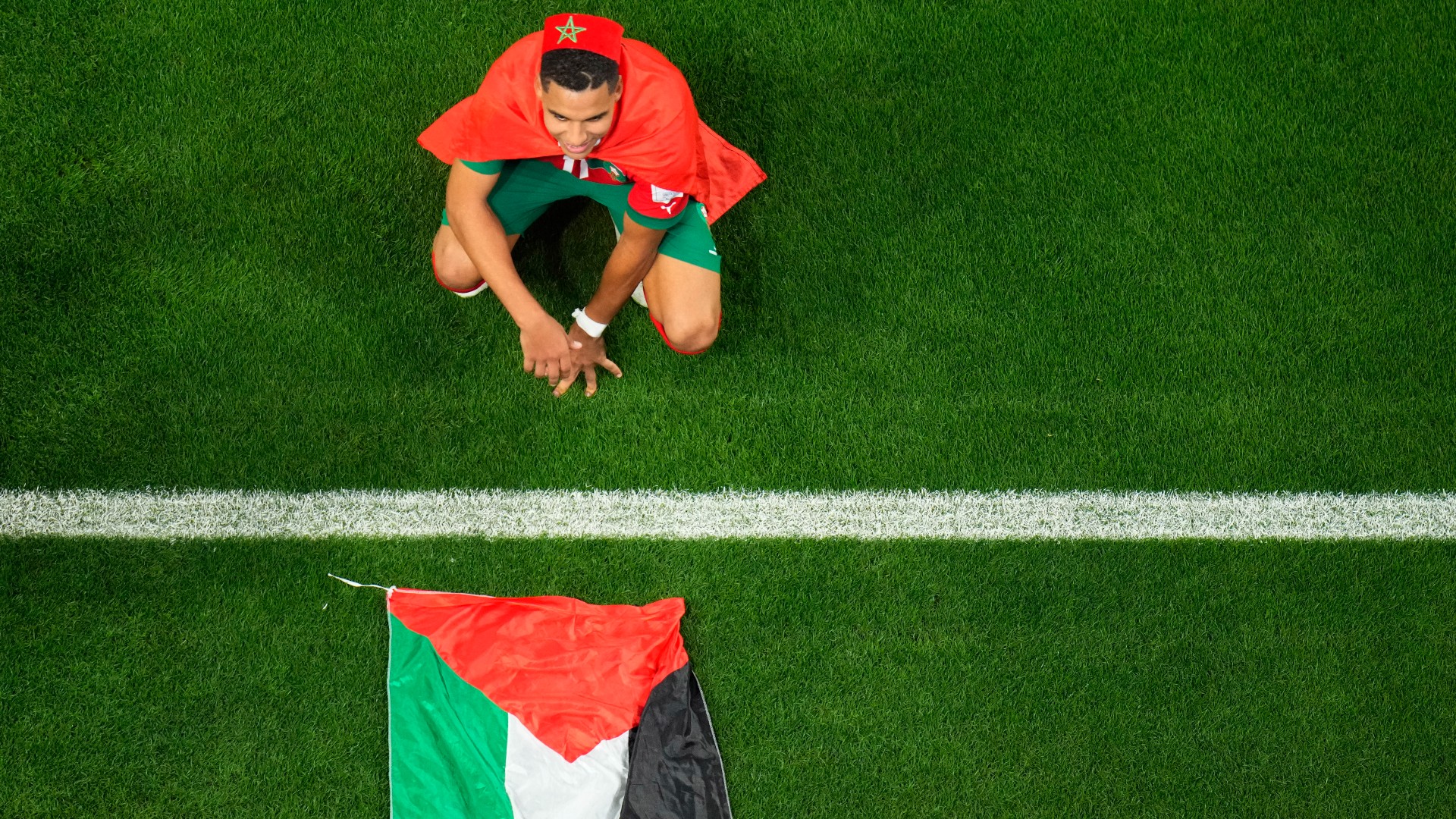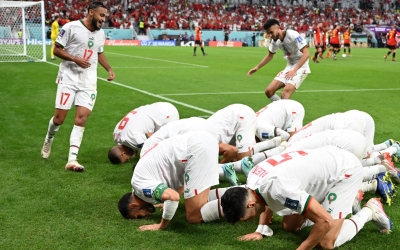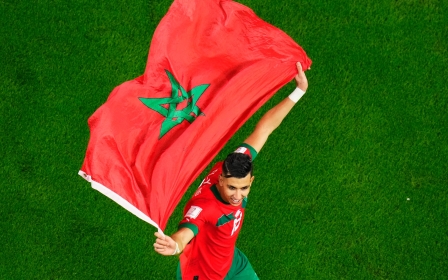World Cup 2022: Morocco's Atlas Lions unite fans with roar for Palestinian cause

Mahmoud Hassan was at the Education City Stadium in Qatar when Morocco booked their place in the World Cup quarter-finals after their sensational penalty shoot-out win against Spain.
Standing on his chair at one of the cheaper sections of the stadium, he raised his arms, began chanting in Arabic and within a few minutes had spurred the entire section to join in.
As he and a few other Moroccans led the chorus, fans from Qatar, Lebanon and Egypt all joined in.
"Oh my beloved Palestine,
Where are the Arabs? They are asleep.
Stay informed with MEE's newsletters
Sign up to get the latest alerts, insights and analysis, starting with Turkey Unpacked
May God protect you," he and other fans bellowed at the top of their voices.
The chant is usually sung by fans of Morocco's most successful football team Raja Casablanca, but the lyrics, and others which have absolutely nothing to do with football, have become the unofficial anthems of the first ever World Cup to be held in the Middle East.
Meanwhile, on the pitch, as the team huddled for a photograph to capture the moment, the players unveiled a flag - but it wasn't Morocco's emblem of the five-pointed green star swimming in a sea of red.
'The popular support and sentiments towards Palestine reveal the real gap between Arab regimes and their people regarding Palestine'
- Khalil al-Anani, Doha Institute of Graduate Studies
Stretched out so it could be displayed in all its glory was the Palestinian flag.
In their moment of triumph, the Moroccan players stopped to draw attention to a place, and a cause, that unites Arab fans and citizens from across the region.
Hours later, midfielder Abdelhamid Sabiri posted a story on Instagram of himself kneeling behind a Palestinian flag with the caption: "For the people without voice."
These moments have proved all the more striking in light of Morocco's controversial decision to normalise relations with Israel, an unpopular step among ordinary Moroccans and one that only a handful of other countries in the region have taken.
The Palestinian activist Muna el-Kurd attended the match and held aloft a Moroccan flag following the surprise win. A Filipino-Palestinian influencer then shared a video of Palestinians in the Gaza Strip celebrating the Atlas Lions' message of solidarity, commenting: "The bond is real."
Tareq Sawalmeh, an English teacher in the Moroccan capital of Rabat, could hardly agree more. While his mother's family hails from Morocco's north, Sawalmeh's father, a Palestinian, grew up in the Far'a refugee camp in the occupied West Bank. Sawalmeh himself has made several trips to Palestine over the years.
"When the first thing a Moroccan player does after he wins is to raise the Palestinian flag, this act alone speaks volumes," Sawalmeh told Middle East Eye.
"Moroccans have made us Palestinians nothing but proud during the World Cup."
'Celebrating our win as one'
For Sawalmeh, cheering the Moroccan national team and supporting Palestine go hand in hand.
"Even though I didn't grow up in Palestine, the Palestinian cause has always been part of who I am," he said. "I'm always in contact with my father's family, all while being a Moroccan citizen and a Moroccan patriot."
Even Atlas Lions fans without Sawalmeh's familial links see championing Palestinians as part and parcel of Moroccan national identity.
"As an ethnically diverse country, our nationalism and sense of belonging is widely based on ideals - in this case religious and human, rather than racial," said Zahra Bahjawi, a financial analyst in the Moroccan university town of Ifrane.
"Therefore, we incorporated the Palestinian fight as our own, especially as it paralleled Morocco's decolonisation and the people’s frustrations with the stifled freedom of expression that followed."
Bahjawi recalled seeing students and professors in Ifrane sporting Palestinian-style keffiyehs while watching the game between Canada and Morocco, though such displays of solidarity predate this iteration of the World Cup.
El Watan News reported in 2018 that Moroccan fans chanted pro-Palestinian slogans and held Moroccan and Palestinian flags outside a stadium at the World Cup in Russia.
The following year, Moroccan fans sang in support of Palestine and waved Palestinian flags at a game between Raja Casablanca and its Palestinian opponent Hilal Al-Quds in Casablanca, Morocco's largest city.
"Moroccans have a very tight relationship with their country, but most of them consider Palestine their second country," said Majda El Hadna, an interior architect in Casablanca.
El Hadna has a personal connection to Palestine. She has a Palestinian grandmother and visited Gaza as a child, well before Israel imposed its debilitating blockade on the Palestinian enclave.
Even so, she sees Palestine as a national cause, not an individual one.
"One of my favourite things to see after every Moroccan win in the World Cup is the Palestinian flags, because it shows the love we have for Palestine," she told MEE. "We're celebrating our win as one country."
The Challenges of Politics
Moroccan fans' displays of solidarity with Palestine at the World Cup hint at a wider undercurrent: widespread opposition to Morocco's normalisation of relations with Israel.
In October 2020, some two months before Morocco announced diplomatic recognition of Israel, the Arab Centre for Research and Policy Studies released the results of a poll indicating that 88 percent of Moroccans opposed normalisation, with 70 percent agreeing that "the Palestinian cause concerns all Arabs and not the Palestinian people alone".
The numbers shifted somewhat over the following year, in part because of what Morocco received in exchange for consummating ties with Israel: the United States' diplomatic recognition of Moroccan sovereignty over the Western Sahara, a cause not only central to the kingdom's foreign policy but also dear to many Moroccans.
'The people are with the Palestinian cause'
- Danyel Reiche, Georgetown University in Qatar
The findings of a survey published in October 2021 by the Arab Barometer, a research group, found that 41 percent of Moroccans backed normalisation with Israel, a jump in support attributed to enthusiasm for Morocco's diplomatic gains on the Western Sahara.
Still, the survey indicated that a majority of Moroccans stood against diplomatic recognition of Israel.
"No matter how good normalisation was, I could only think of the blood shed for Israel to be named a country," said El Hadna. "I couldn't stand such hypocrisy."
When Moroccans want to demonstrate opposition to their government, football offers a key venue, as their government closes other avenues for freedom of expression. During a 2019 match in the northern city of Tangier, Moroccan fans chanted the song entitled "This is a land of humiliation" to criticise political corruption.
Atlas Lions fans' expressions of Palestinian solidarity follow the same model.
Danyel Reiche, a visiting associate professor of international relations at Georgetown University in Qatar, noted pro-Palestinian sentiment was one of the few forms of activism allowed by World Cup organisers.
"It shows that normalisation is an elite project, as before in all other countries that normalised relations with Israel," he told MEE. "The people are with the Palestinian cause."
This implicit criticism of normalisation culminated with the Atlas Lions themselves brandishing the Palestinian flag.
"The Moroccan team accepted the responsibility that comes with this much soft power and chose to break from the biggest form of oppression in sports: silence," said Bahjawi, the fan from Ifrane.
"Especially in Morocco, the more recent suppression of media is evocative of the sore past of the Years of Lead," Bahjawi said, in reference to the decades of King Hassan II's rule over Morocco, which was marked with state violence and political repression.
"When silence is imposed, pictures speak a thousand words."
'Moroccans and Palestinians brought closer'
However, some Atlas Lions fans would prefer to keep politics off the field.
Marya Kriem, a student in Rabat who described herself as "neutral" on Israel and Palestine, questioned the utility of fellow fans' pro-Palestinian activism.
"Honestly, the Palestine-Israel conflict has lasted so long that we've become a little used to the situation," she said. "Shouting and raising flags and labels hardly changes anything. The proof is that since 1948 the situation has not changed enormously. People still live in misery."
'Seeing the ongoing support for Palestine among the players and spectators has made me extremely proud as a Moroccan-Palestinian'
- Tareq Sawalmeh, Moroccan-Palestinian football fan
Kriem counts herself among the still-sizeable minority of Moroccans who view normalisation as advancing Morocco’s national interests. This group also includes some Moroccan World Cup attendees.
Mohamed Beydoun, a fan who flew from Casablanca to Doha to catch Tuesday's match between Morocco and Spain, called the Palestinian issue "a manufactured crisis to keep tensions in the Middle East and give Iran more legitimacy".
In the moments after the game, he paid more attention to the implications of the Atlas Lions' historic win than to the players' unfurling of the Palestinian flag.
"They're free to support the cause," he told MEE. "It's their point of view and it must be respected. But it shouldn't be taken as a provocation because they're not the country or representative of the country's position."
But the number of Moroccans who share this view appears to be shrinking fast. The most recent poll from the Arab Barometer, released in July, found that only 31 percent of Moroccans supported diplomatic recognition of Israel, a 10 percent dip from October 2021.
"The popular support and sentiments towards Palestine that have been shown in the World Cup in Qatar reveal the real gap between Arab regimes and their people regarding Palestine," said Khalil al-Anani, an associate professor of political science at the Doha Institute of Graduate Studies.
"In that regard, Morocco is not an exception. Indeed, if anything, it proves that normalisation between Morocco and Israel will remain as cold as the one with Egypt and Jordan, which normalised relations with Israel decades ago."
The kingdom's leadership, perhaps wary of its foreign policy's divergence from public opinion, has highlighted its pro-Palestinian credentials during the World Cup.
On the International Day of Solidarity with the Palestinian People - November 29, two days after Morocco's decisive victory over Belgium - King Mohammed VI released a statement emphasising his "country's clear and firm position regarding the justness of the Palestinian cause and the legitimate rights of the Palestinian people".
The king focused on his chairmanship of the al-Quds Committee, an arm of the Organisation of Islamic Cooperation dedicated to safeguarding Jerusalem's cultural heritage.
His statement concluded with a reiteration of Morocco's "sincere, continuous commitment" to Palestine, an echo of Moroccan World Cup fans' and footballers' frequent shows of solidarity with Palestinians.
"Seeing the ongoing support for Palestine among the players and spectators has made me extremely proud as a Moroccan-Palestinian," said Sawalmeh, the teacher in Rabat.
"If anything, the World Cup has brought Moroccans and Palestinians closer together."
Middle East Eye delivers independent and unrivalled coverage and analysis of the Middle East, North Africa and beyond. To learn more about republishing this content and the associated fees, please fill out this form. More about MEE can be found here.








